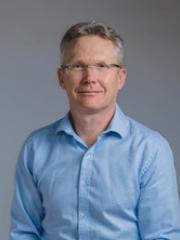Professor Paul Lant

Researcher biography
Paul Lant is a Professor in the School of Chemical Engineering at The University of Queensland. Paul has a long history of teaching and research at UQ, and he has held a variety of roles. He was the Head of the School from 2009-2013, during which time he led the establishment of the new School, including the introduction of many new teaching, research and engagement activities. He has a history of successful start-up ventures across his portfolio of research, teaching and commercialisation. He has led many new teaching initiatives and been a key player in establishing UQ Chemical Engineering as a world leader in chemical engineering education innovation. He has started several commercial ventures and has been a Director of several companies. Paul was a Founder and Director of Wastewater Futures Pty Ltd for 20 years. Wastewater Futures is an Australian company that provides process engineering services throughout the entire life cycle. He has consulted widely to industry in Australia, including acting as an Expert Witness in Qld.
Paul is a Fellow of the IChemE and a Registered Professional Engineer Qld (RPEQ). Paul was a Fellow of the Australian Institute of Company Directors from 1998-2019.
RESEARCH:
Paul's research portfolio is diverse, and aimed at addressing some critical global challenges and also core challenges facing the hazardous industries. Currently, his major activities are:
The New Plastics Economy: Plastics and plastic waste are globally significant issues. Paul has been leading work at UQ for over 17 years investigating the production of PHA biopolymers. He established the PHA research group at UQ in 2003. Since then, UQ has conducted research on PHA with a total value of approximately $25m. The UQ PHA research group are now recognised as global leaders in biodegradable plastic research, and have had long term partnerships with international companies including Veolia and Norske Skog.
Urban Water Systems: Paul has an international reputation for his research work in the field of urban water systems. Current work focuses on water-carbon-energy linkages in cities.
Energy and Poverty: In 2014, Paul co-founded the Energy and Poverty Research Group at UQ. This is a pan-UQ initiative incorporating the disciplines of engineering, business, social science, environmental science, policy, communications and psychology. The mission is to support positive social, environmental and health outcomes that are vital for sustainable and productive livelihoods in energy impoverished communities in the developed and developing world.
UQ R!SK: Paul co-founded UQ R!SK in 2015 with his colleague A/Prof Maureen Hassall (Director). UQ R!SK is an interdisciplinary initiative to deliver practical, evidence-based outcomes that help hazardous industries address current and future risk challenges. The vision for UQ R!SK is to be a world leader in developing practical and innovative, human-centred operational risk management approaches that deliver real improvements in performance and sustainable competitiveness for hazardous industries.
Paul has a very successful track record of establishing productive collaborative partnerships with industry, and for winning competitive research funding. He has been a CI on 19 prestigious ARC projects, and he has also attracted significant support from industry for research. Paul has been a chief investigator on projects that have attracted in excess of $21 million in grant support from Govt and industry. Paul also led the bid to establish the Dow Centre for Sustainable Engineering Innovation in 2012. This was established with a $10M gift from Dow. Paul was also a lead CI on the ARC ITCC on Bioplastics and Biocomposites (2021-2026) which was established with $5m of ARC funding and $1.5m from industry and Government. Paul has been a co-author on over 150 journal publications and he has supervised 50 PhD students to date. He has an h-index of 54 and 11500 citations (Google Scholar, Aug 2021).
TEACHING AND LEARNING:
An established chemical engineering educator, Paul has received national awards for innovations in undergraduate teaching and supervision of postgraduate students. He was a member of teams winning national teaching awards for both undergraduate and postgraduate education in 2005 and 2006. Paul led the establishment of IWES in 2002. IWES is the leading provider of environmental short course training for Australian industry.
